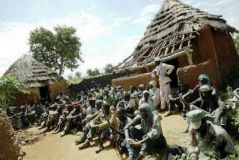Sudan’s Darfur rebels demand separation of religion and state
ABUJA, Oct 29 (AFP) — Rebel leaders from the war-torn Sudanese region of Darfur demanded that Islam be kept separate from the state, opening up another potentially dangerous rift between them and the Khartoum government.

|
|
Sudan Liberation Army rebels from different bases come together for a meeting in Tarenjer village, west Darfur, October 11, 2004. |
As African Union peace talks in the Nigerian capital Abuja moved on to discussion of a political settlement to the 20-month-old civil conflict, rebel leaders called for a clear division between religion and the state in Sudan.
“We are now prepared to start deliberations on the political issues, following the appeal of the international observers and facilitators,” said Mahgoub Hussain, spokesman for the rebel Sudan Liberation Movement (SLM).
“Firstly, we’ll start with the declaration of principles. We want a clear distinction between the state and religion. Right now in Sudan you have a situation where Islam is given prominence over other religions,” he added.
“This shouldn’t be so. Even though I’m a Muslim, we want religion to be a personal thing with every citizen having the freedom to practice what he believes in,” he explained.
The rebel demand was immediately rejected by government negotiators, who insisted that mainly-Muslim northern Sudan, including Darfur, should be governed by principles of Islamic law.
“Darfur is in the north, so Sharia law should apply. It is not negotiable,” said Abdul Zuma, media adviser to the Sudanese government at the talks.
Darfur’s black African tribes are predominantly Muslim but regard themselves as culturally separate from the Arabs who dominate the Khartoum government.
In earlier peace negotiations with mainly Christian rebels in southern Sudan the government conceded that Sharia law would not apply there under an eventual settlement, but the western region of Darfur was not included in the offer.
Darfur’s warring parties have been meeting in Abuja for more than a week in a bid to find a way out of a conflict which has claimed tens of thousands of lives and driven an estimated 1.5 million civilians from their homes.
The rebels launched an insurrection last year to fight for greater autonomy and public spending for their region, alleging that Khartoum’s Arab-led regime discriminates against black populations.
In a presentation to the talks the SLM said that “a lasting solution to the armed conflict in Darfur will require an agreement on decentralisation of power and protection for the rights of all ethnic groups and religious groups.”
Hussain also accused Khartoum’s forces of breaching a ceasefire agreement and killing 14 civilians in an air raid on the rebel-held village of Katial, in western Darfur 35 kilometres (20 miles) outside the regional centre of Nyala.
He said the attack had taken place on October 27 and that government forces backed by the Janjaweed Arab militia were moving in on three more communities, Alashma, Labdon and Marla. It was impossible to confirm the allegations.
“This violation of the ceasefire agreement is the confirmation of our position that this government is not serious about the talks,” Hussain said.
Alongside the Abuja talks, the African Union has sent the lead elements of what will be become a 3,250-strong truce-monitoring force of troops from six African countries to Darfur.
A small group of 47 Nigerian soldiers arrived in El-Fasher, their new headquarters in northern Darfur, on Thursday on board a UN air force transport plane, but their arrival has already run into controversy.
According to the official SUNA news agency Sudan is to demand that each soldier is to present a certificate proving he is free of the HIV/AIDS virus, or face tests. There has as yet been no AU reaction to this demand.
